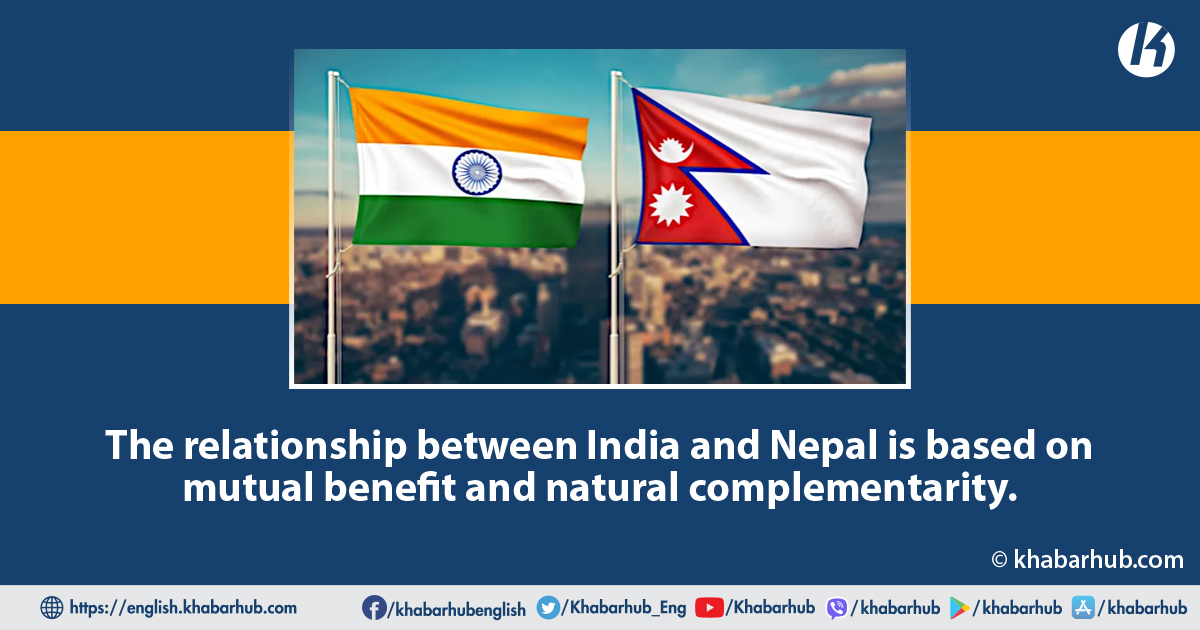While India is celebrating its ‘Azadi Ka Amrutkal’ it is also looking to refresh and boost its long-held warm relationship with neighboring countries, especially with Nepal.
Certain initiatives such as railway and transport connectivity, and the Buddha circuit are already underway and India looking to more shared initiatives for development.
The relationship between India and Nepal is based on mutual benefit and natural complementarity.
The two countries have great intentions of doing good to each other.
The two very uniquely linked neighboring countries India & Nepal are among those rare states that not only share borders but also the centuries-long close bonds of civilization and culture.
This relationship is deeply rooted and can be traced back to the rule of the Sakya clan and Gautama Buddha.
The adamantine religious belief that the visit of Kedarnath in Uttarakhand, India is incomplete without visiting Pashupatinath in Nepal is another example of the undoubted legacy of cultural connectivity between the two.
The reciprocity of the honorary title of ‘General’ between two countries is unique in itself, especially when India has decades-long animosity with another neighbor.
Further, there is a tradition to appoint a south Indian Bhatt priest in the Pashupatinath temple, hence, several such religious priests have settled there. India and Nepal have a relationship based on mutual respect and cooperation with a time-tested bond of common history, culture, and geography, which has strengthened their ties over the centuries; unlike China which transgressed the neighborhood ethics by invading Tibet.
The occupation of Tibet by China in 1951 posed security concerns for India and highlighted the importance of Nepal for it.
Nepal has never been a threat to India instead India considers any threat to Nepal as a threat to it.
Threat to Nepal emanates from Chinese big brotherly intent since the time Mao Zedong asserted in a speech on 15th November 1939, that Tibet was the right palm of China and Ladakh, Nepal, Sikkim, Bhutan, and Northeast Frontiers of Arunachal Pradesh as the five fingers of this palm.
An important step towards establishing such an order to safeguard each other’s interests was the signing of the Treaty of Peace and Friendship between India and Nepal on July 31, 1950.
This opened the way for unprecedented privileges for both countries.
Another facet of the Nepal-Indo special relationship is an arrangement for visa and passport-free travel to each other’s territory.
Although India is not the only country that provides a free visa regime to Nepal, this arrangement between the two countries has opened up a floodgate of opportunities for the people of both countries.
As of March 2023, Nepalese passport holders can travel visa-free to 14 countries and territories, however, one must have a valid passport and must purchase travel health insurance as per the norms of the destination country.
Traveling to India, on the other hand, is much simpler and easy. Due to the open border citizens of both India and Nepal can easily migrate to each other’s country without any obstacles to lawful work.
This open border and easy access to India has been a boon for Nepalese migrant workers as they can easily enter the other side of the border in search of a higher wage, job opportunities, better amenities, social networks, and opportunities for upward social and career mobility.
Though it is difficult to determine the exact figure of Nepalese migrants in India, at least 3 million Nepalese are working in different parts of the country to meet their daily needs back home.
As per the UNESCO figures, of the total 95,268 Nepali students studying abroad in 2022, 13,574(14.42%) are in India.
The Indian academic institutions offer affordable courses in BBA, MBA, Engineering, and several other professional courses for students from Nepal.
This has been the main reason for them to pursue higher education in India which is qualitatively at par with many of the esteemed Western universities.
Moreover, these institutions also offer campus placement to Nepali students helping them to establish successful careers in streams like IT, management, engineering, medicine, etc.
For a medical emergency, a family where within-country treatment is not possible has to go through an arduous process of getting a Medical visa.
Ask a Nepali, s/he still saves his energy and time as only transportation is required to access Indian hospitals and not running to Consulates or Embassies for a medical visa is not required.
The worth of this concession can be well understood when hundreds of Nepalese students who were studying medicine in China were denied entry in February 2022 on the pretext of COVID-19, even when the pandemic was almost over.
They were forced to get virtual practical classes without equipment and labs.
The bilateral relationship between India and Nepal remains strong and should stand above any trifle differences. It is destined to grow further in the coming years.
When Field Marshal Manekshaw extolled the courage of a Gurkha soldier, he meant it and outlined the trust for the clan in presence of many other gallant regiments in India at any point in time.
The reciprocity of the honorary title of ‘General’ between two countries is unique in itself, especially when India has decades-long animosity with another neighbor.
This astonishing mutual reverence for each other’s entity is envying many.
The famous seven Gorkha regiments, where two-thirds are recruited from Nepal, presently have around 30000 soldiers from Nepal.
The more astonishing fact is that there is a 1.4 lakh strong community of Indian Army pensioners in Nepal.
This institutional phenomenon has been static even when India is still pushing hard to address the unemployment issue of its own.
Despite some treacherously propagated differences between India and Nepal, some undeniable dots are connecting them altogether.
The bilateral relationship between India and Nepal remains strong and should stand above any trifle differences. It is destined to grow further in the coming years.









Comment